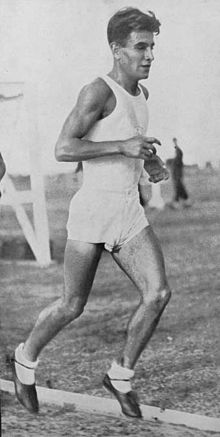1932 Summer Olympics / Athletics - Marathon (Men)
|
|
|||||||||

|
|||||||||
| sport | athletics | ||||||||
| discipline | Marathon run | ||||||||
| gender | Men | ||||||||
| Attendees | 28 athletes from 14 countries | ||||||||
| Competition location |
Los Angeles Memorial Coliseum (start and finish) |
||||||||
| Competition phase | August 7, 1932 | ||||||||
|
|||||||||
The men's marathon at the 1932 Olympic Games in Los Angeles started on August 7, 1932 at the Los Angeles Memorial Coliseum . 28 athletes started the race, 20 finished.
The Olympic champion was the Argentine Juan Carlos Zabala ahead of the Briton Sam Ferris . The Finn Armas Toivonen won the bronze medal.
Existing records
- World best: 2: 29: 01.8 h - Albert Michelsen ( USA ), Port Chester , Port Chester Marathon , October 12, 1925 - World records are not held at this distance because of the different track conditions.
- Olympic record : 2:32: 35.8 h - Bill Carr ( USA ), Antwerp , August 22, 1920
Routing
After two and three-quarters laps of the stadium, the route turned left into Bill Robertson Lane (then Menlo Avenue ). Then it turned right onto Martin Luther King Jr. Boulevard (formerly Santa Barbara Boulevard ). The rest of the route was as follows: left into Normandie Avenue , right into Florence Avenue , then left again into Western Avenue , then left into Manchester Avenue , then right for about three miles into Vermont Avenue . Now the path turned right into El Segundo Boulevard and followed this another 6.5 km. Then it went right again on Inglewood Avenue , then right on Arbor Vitae Street . Shortly after the 30 km mark, the route turned left onto Prairie Avenue . Past Inglewood Park Cemetery , she then turned right onto Florence Avenue . The railway line was crossed via Redondo Boulevard , then left into West Boulevard and at kilometer 35 right into Slauson Avenue . The route led back into the stadium via Normandie Avenue , Santa Barbara Boulevard and Menlo Avenue . The finish line followed after a final three-quarters round of the stadium.
The race
Date: August 7, 1932
As early as 1931, the then 19-year-old Argentine Juan Carlos Zabala made people sit up and take notice with a time of 2:33:19 h in his first marathon . However, the top favorite was the Brit Sam Ferris, who had the experience of two Olympic participations and also had very successful appearances in recent years.
The race started at 3:38 pm. Zabala immediately took the lead and ran out of the stadium first. Michele Fanelli (ITA), Margarito Pomposo (MEX), Paul de Bruyn (DEU) and Clifford Bricker (CAN) positioned themselves right behind him. At the second control station at around 7.2 km, Zabala led before Pomposo, followed by Bricker, José Ribas (ARG), the owner of the world record Albert Michelsen (USA), the Japanese Seiichiro Tsuda, Taika Gon and Onbai Kin as well as the Dane Anders Andersen . At twelve kilometers, the Mexican Pomposo took the lead, but by the third control station at 15.3 kilometers, Zabala had taken the lead again. Bricker, Gon, Ribas and Michelsen were also able to overtake the Mexican.
At halftime at the fourth control station, Zabala was still in the lead. Behind him, the Finn Lauri Virtanen, bronze medalist in the 5000 and 10,000 meters, moved up to second place, behind him his compatriot Armas Toivonen was now third. The Japanese Tsuda was 30 seconds behind Toivonen, followed by Bricker, Michelsen and Hans Oldag (USA). After about 25 km Virtanen passed the Argentine. After control station five, the runners had to cope with a 5 km climb. Virtanen had a glass of milk. The Finn, with no experience on the marathon route , had to retire after 37.5 km.
Meanwhile, the British Dunky Wright had run up to second place. Toivonen, Sam Ferris, another Briton, and Tsuda followed. Ferris and Toivonen now accelerated and overtook Wright. Zabala was the first to return to the stadium. Exhausted, he was able to perfect the first Olympic victory for an Argentine in athletics. By the time he crossed the finish line, three more runners had already reached the stadium. 19 seconds behind Zabala Ferris finished second, another 17 seconds later Toivonen ran ahead of the British Wright and the Japanese Tsuda for the bronze medal.
literature
- Ekkehard zur Megede , The History of Olympic Athletics, Volume 1: 1896-1936, Verlag Bartels & Wernitz KG, Berlin, 2nd edition 1970, p. 232f
Web links
- SportsReference Marathon , accessed September 17, 2017
- Official report pp. 427-429, engl. (PDF), accessed on September 17, 2017
- Los Angeles 1932 Olympic Marathon | Marathon Week , published April 22, 2015 on youtube.com, accessed September 17, 2017
Individual evidence
- ^ IAAF Statistics Handbook, Berlin 2009 Page 565 ( Memento from June 29, 2011 in the Internet Archive )
- ^ David E. Martin, Roger WH Gynn: The Olympic Marathon - Human Kinetics Pub Inc., 2000 (English) - ISBN 978-0880119696
- ↑ David E. Martin, Roger WH Gynn: The Olympic Marathon (pp. 154-156) - Human Kinetics Pub Inc., 2000 (English) - ISBN 978-0880119696
